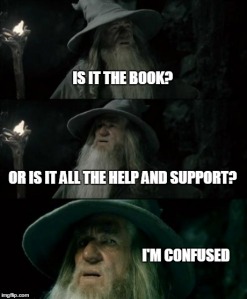We start the chapter with Martín cleaning up the house. Despite the fact that he has lived in that run-down old house for seven years, doing nothing but write and sleep and occasionally going for a stroll, he can clean the whole house in a morning. I have a hard time cleaning my four-bedroom generally well-kept house in a morning, so it stretches the boundaries of belief that Martín can do his unkempt house in ill-health in a morning.
Nevertheless, he cleans the house, buys flowers only to discover when he comes home that he doesn’t know where the vases are. Cristina finally comes by in the afternoon and comments on his house, asking why he chose to live in such big house all alone.
Someone who lives alone, I thought. You end up becoming what you see in the eyes of those you love.
While I think that statement has some truth in it, it does not really apply here, does it? He didn’t become someone who lives alone, he has been someone who lives alone for the last seven years. It hardly took Cristina mentioning it for him to become it.
Cristina’s visit to Martín is not a friendly, social visit. She wants something from him. She wants him to help Vidal.
‘You’re his best friend. You know him. He talks about you as if you were his son. He loves you more than anyone. You know that.’
I am not sure that this is necessarily true, even though Cristina is probably close enough to Vidal to know how he feels. But she could just be saying this to make Martín help Vidal. What I have seen of Vidal so far is that he does like to meddle into Martín’s affairs, and he is concerned about Martín, but I haven’t seen such deep love.
Apparently Vidal is working on his masterpiece and it is not going well. He has lost faith in his book, he keeps revising and making things worse.
‘He says he envies you, he wants to be like you…’
Cristina goes on to say that Vidal is drinking and that if Vidal knew that she went to Martín, he would be furious. All in all a dismal picture.
I felt an intense cold invading me: the knowledge that while the man to whom I owed my life had plunged into despair, I had been locked in my own world and hadn’t paused for one second to notice.
Finally Martín has a bit of self-insight.
So Martín agrees to help Cristina save Vidal’s manuscript by rewriting it.
I will never know whether I did it to help Vidal, as I kept telling myself, or simply as an excuse to spend more time with Cristina.
I would hazard a guess and say he did it to spend more time with Cristina. He hasn’t cared for anyone else so far, except Cristina, why would he start caring now?
They start working on the story. As Cristina is Vidal’s secretary, she receives the pages from Vidal to type up. Instead of typing them up, she brings them to Martín and together they revise the story so that it becomes a good story. Martín is a bit surprised that the story is based on an idea which Martín had pitched to Vidal a long time ago and that Vidal hadn’t told him he would use the idea. He is also surprised how badly it is written.
The storyline put together by Vidal was so vague and insipid that I decided to recover the one I had invented when I originally suggested it to him. Slowly we brought the characters back to life, rebuilding them from head to toe. Not a single scene, moment, line or word survived the process and yet, as we advanced, I had the impression we were doing justice to the novel that Vidal carried in his heart and had decided to write without knowing how.
Right. Martín is an infinitely better writer than anyone else he knows. Is it just me or is that point belaboured time and again?
They work hard on the manuscript and Vidal doesn’t notice that his work is rewritten. While I do agree with Martín that Vidal would be the type of person to think highly of himself, considering how down he was on his writing, would he not raise his eyebrows a bit at how good he has suddenly become in the style of Martín?
Cristina is getting worried about Martín, as he works hard on Vidal’s manuscript by day, and writes his own City of the Damned stories by night, leaving him barely any sleep.
‘Perhaps you should slow down a bit. You don’t look well.
Based on the reports in the chapters before this, Martín hasn’t looked well for years, so odd of Cristina to only notice that now.
I’m not worried about Pedro any more – I’m concerned about you.’
‘Something good had to come of all this.’
What does Martín even mean by that last sentence? What is that something good? Him collaborating with Cristina? Making Vidal happy? It’s very vague.
Martín is getting more and more unwell, but it’s all worth it because he is spending time with Cristina.
I knew perfectly well that Cristine could read it in my eyes every time she came, and I knew perfectly well that she would never respond to my advances.
Despite this, he “grows bolder” and holds her hand from time to time.
She let me, but I knew it made her feel uncomfortable;
Then why do you do it, you creep? Especially since you know “perfectly well” she won’t respond to your advances.
she felt that it was not right, that our debt of gratitude to Vidal united and separated us at the same time.
Or maybe she just doesn’t like you that way, have you ever thought about that? She wasn’t particularly interested in you before you started this whole project.
One night, shortly before she left, I held her face in my hands and tried to kiss her. She remained motionless and when I saw myself in the mirror of her eyes I didn’t dare speak. She stood up and left without saying a word.
We really aren’t supposed to like Martín, are we? I am confused about that, because he is such a dick; there is no way Carlos Ruiz Zafón intended him as a likeable character who we have to feel compassion for, right?
Martín feels that Cristina doesn’t approve of his writing City of the Damned either and that cuts him to the core. He knows deep down that she is right and that he does not have the courage to write from the heart.
I fantasied about ending my contract and writing a book just for her, a book with which I could earn her respect. If the only thing I knew how to do wasn’t good enough for Cristina, perhaps I should return to the grey, miserable days of the newspaper. I could always live off Vidal’s charity and favours.
He has known for a while that this is how she felt, as Vidal had told him, and that hasn’t made him change his writing habits, so this doesn’t really ring true. He has always seemed quite happy to write his heart out and enjoy the success of his City of the Damned stories and the only interest he has shown in Cristina so far has only been sexual. He didn’t really care about her feelings when he kissed her and kept pawing her hand, so why should he care now?

At the end of the chapter, Martín goes out for a walk to the Sagrada Familia, which is still a building site at that time. In fact, it is still not finished, not expected to be finished until 2026. He walks around, ends up on the tram line and when a tram approaches, he is unable to move. He sees a blinding light and passes out right after seeing the tram coming to a stop centimetres in front of his face. So I guess his crippling headaches were more than just headaches and have finally caught up with him.
 Five women and one man meet monthly to discuss Jane Austen’s books and during this time their lives intersect and change. I have literally just finished reading this book and already I feel there is very little to tell about it. Things happen, stories are told about the women’s pasts and some of them fall in love in the mean time.
Five women and one man meet monthly to discuss Jane Austen’s books and during this time their lives intersect and change. I have literally just finished reading this book and already I feel there is very little to tell about it. Things happen, stories are told about the women’s pasts and some of them fall in love in the mean time.






